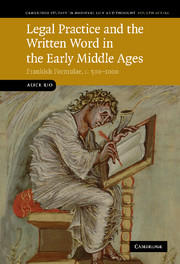Book contents
- Frontmatter
- Contents
- List of tables
- Acknowledgements
- List of abbreviations
- INTRODUCTION
- Part I Formulae, Charters and the Written Word
- Part II Inventory of the Evidence
- Part III Formulae as a Historical Source: Limits and Possibilities
- 5 DATING FORMULAE
- 6 LOCAL CONTEXT AND DIFFUSION
- 7 FROM LATE ANTIQUE NOTARIES TO ECCLESIASTICAL SCRIBES: WHEN, WHERE AND WHY FORMULARIES SURVIVE
- 8 FORMULAE AND WRITTEN LAW
- 9 A METHODOLOGICAL TEST-CASE: SLAVERY AND UNFREEDOM IN THE FORMULARIES
- CONCLUSION
- Appendix A handlist of manuscripts
- Bibliography
- Index
- Manuscript Index
9 - A METHODOLOGICAL TEST-CASE: SLAVERY AND UNFREEDOM IN THE FORMULARIES
Published online by Cambridge University Press: 14 August 2009
- Frontmatter
- Contents
- List of tables
- Acknowledgements
- List of abbreviations
- INTRODUCTION
- Part I Formulae, Charters and the Written Word
- Part II Inventory of the Evidence
- Part III Formulae as a Historical Source: Limits and Possibilities
- 5 DATING FORMULAE
- 6 LOCAL CONTEXT AND DIFFUSION
- 7 FROM LATE ANTIQUE NOTARIES TO ECCLESIASTICAL SCRIBES: WHEN, WHERE AND WHY FORMULARIES SURVIVE
- 8 FORMULAE AND WRITTEN LAW
- 9 A METHODOLOGICAL TEST-CASE: SLAVERY AND UNFREEDOM IN THE FORMULARIES
- CONCLUSION
- Appendix A handlist of manuscripts
- Bibliography
- Index
- Manuscript Index
Summary
One of the most important questions historians have asked about the first millennium relates to the disappearance of slavery, and the transition from slavery to serfdom: that is, the transition from a state of unfreedom in which persons were treated as objects, bought and sold with no legal rights, and which involved only a restricted class of both domestic and rural workers, to a more limited type of subjection to a lord, involving the majority of the rural population. The switch from a slave-owning society to a non-slave-owning society clearly constitutes a radical transformation, a sea-change from one way of understanding and formulating power relationships to another, and therefore constitutes a crucial aspect of the debate over the end of antiquity; remarkably, however, it seems to have elicited no comment at all from contemporaries, and our sources therefore give us curiously little help in charting what is arguably one of the most significant changes in European history. The issue is further complicated by the fact that eleventh-century serfs, with their relative autonomy, were referred to by the same word, servus, as the chain-gang slaves of the Roman period, even though the word clearly referred by then to something quite different.
- Type
- Chapter
- Information
- Legal Practice and the Written Word in the Early Middle AgesFrankish Formulae, c.500–1000, pp. 212 - 237Publisher: Cambridge University PressPrint publication year: 2009



